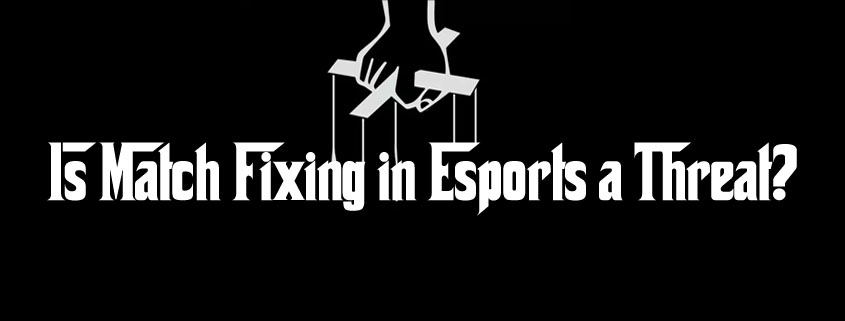Match fixing is one of the most talked about topics in today’s esports scene. It has been in the headlines extensively in 2016 and 2017, following the biggest cheating scandal in Korea at the end of 2015, when 12 people were arrested on the charges of fixing a number Starcraft 2 matches. Among them were three players who immediately received lifetime bans.
There have been similar problems before, but it was all taken with a pinch of salt, especially due to the infancy of high level professional tournaments. In short, it was treated as an expected hiccup in the evolution of one sport.
What many people failed to realize is that gamers hate cheating, probably more than any other sports fans.
That is because cheating in gaming is the highest form of disrespect to the game and is a hatred that everyone shares, from amateurs to high level professionals.
As a competitive activity that requires high levels of skill and thousands upon thousands of hours of practice, it’s no wonder that cheating and match fixing in esports is not taken lightly.
Recently, match fixing in esports received a lot of attention from the main stream media, due to Blizzard’s precise regulations that bans all participants of Overwatch League to place any bets whatsoever.
While doing so, some media outlets have, therefore, called match fixing “the biggest threat to esports” and even went as far as to say that esports have a “big corruption problem on hand”. Unfortunately, these opinions were not consensual.
Therefore, we decided (as lifelong gamers) to round up some of the biggest esports experts in the world, and ask them one simple question that will hopefully put an end to esports bashing once and for all:
What is your opinion on match fixing in esports?
The goal was to find out whether match fixing in esports is an actual threat that we should worry and act upon. Soon enough, we received amazing feedback from some of the biggest VIPs in the scene.
Here are their answers.
Eoin Bathurst
Writer at Esports Observer
Match fixing in esports is as much a concern as it is in real sports.
The media driven environment of today has exacerbated these issues which are actually no more prevalent than they have been in the past within traditional sports such as soccer or basketball.
The difference is, in the past it was much harder to be constantly aware of events like this and for league organisers it was much easier to control the narrative and limit the bad PR that such things could bring to the environment.
Social media has made that much harder to do, which can lead to echo chambers that leave little options for league organisers. Promoting professionalism within the player base is the best way to deal with this and I believe that we need to take more steps than traditional sports have required in the past.
Rewarding players for good conduct is just as essential as punishing those with bad conduct and I hope that organisers and employers will be able to take steps to make that a reality.
Ezekiel Carsella
Senior editor at RealSport101
So match fixing is a very important issue in CS:GO and other esports because it ruins competition and can affect how people get paid.
While match-fixing itself is something that should be frowned upon, the punishments meted out for match-fixing have been far too harsh.
Considering the average age of a professional player can be under 18 in some regions, most players are looking to make money in a field that does not always pay out to everyone.
Every league has different approaches to how they ban match fixers, but the most notable was Valve’s ban of Team iBuyPower for life.
I believe companies such as Valve should mirror the approach traditional sports take and hand out bans with a fixed timeline (between 1 – 5 years depending on severity) and apply them retroactively to the people affected by their lifetime Major bans.
Viktor “vuggo” Jendeby
Manager and coach at Fnatic CS:GO
Match fixing destroys the integrity of the game.
If a team does not play their 100% at all points, regardless of weight of the match, they let down themselves, their organization, the tournament organizer.
And the worst of all, they let down their fans. Disgraceful.
David “Blaze” Dillon
Dota 2 caster and online operations manager at Beyond The Summit
I believe the threat of match fixing in esports is a very real concern, especially in regional divisions with less economic and organizational stability.
I’ve followed closely a number of players who had great potential to succeed, but threw it away at a chance for easy money. While I don’t believe this should always result in a permanent ban and should be evaluated on a case-by-case basis, it is not to be taken lightly.
At the top level of play, it is very difficult to determine whether a team simply had an off game and made too many mistakes or if they deliberately lost a game.
If esport viewers and broadcasters have to start realistically considering the possibility of match fixing every time there’s an upset, interest will stagnate and viewership will start to decline.
It is imperative that all possible steps are taken to maintain the integrity of competitions across all esports.
Kim “Drayich” Larsson
Dota 2 and CSGO caster, DraySWE.se
Match fixing is a rough thing.
We have seen it in every sport to some extent, and esports has also been having these problems. I think it’s related to a scene growing faster than the users of the scene.
When you go from playing in your backyard to, all of a sudden, being a part of something where you even can bet money, some people can’t handle it.
In regular sports, betting has been there for such a long time. When the first betting company came to Dota, people immediately started to discuss match fixing. They questioned whether it would become a problem in the future.
The answer to that question is a very brief — no.
The start of this topic was mostly related to esports players having poor contracts and esports not really looking all that serious in general. On the other hand, there was a problem with the betting companies which didn’t really have a solid systems for dealing with match fixing issues. Some people did fix matches in Dota, but I don’t believe there is a big risk for that now.
First of all Dota has a lot of prize money involved, coupled with the chance to get invited to bigger competitions. I’d say as long as there is money involved in anything there is always a risk of cheaters, but the risk is not bigger within esports. We are in the arenas now, remember?
Robin “Voltie” Takac
CSGO caster
Well, match fixing will happen in all sports that involve prize money of a higher value.
In esports it’s kind of uncommon and usually involves tough penalty.
If you look back at IBP who are still banned from ALL official Valve-hosted events forever for match fixing… Well, then you get it.
Match fixing is not worth it in CS:GO. I’m not too sure on how the scene looks in Dota 2 or LoL for example, but I know match fixing in CS is not worth the risk after seeing what happened to IBP. Being involved in it is literally KILLING the rumour of your brand.
Valve are true to their word, players from famous org Epsilon got banned for life as well for match fixing.
In general, it’s definitely not something you come across in the scene. To me it feels like it’s never gonna happen again to be honest, and if it does then that is just stupid by- and for the players.
(Banned for life = Banned indefinitely, but yeah it’s lifetime I’m pretty sure)
Hugo Byron
CSGO caster and streamer at ItsHugoTV
When large prize money is involved, especially in new and unregulated areas, such as esports is still going through at the moment… match fixing is definitely going to be a problem.
Of course it’s a danger to the sport in the sense of legitimising it to the public and sponsors, but I feel it’s important that people remember that this is not alone to esports, and there are many highly documented cases of match fixing in many sports.
When it comes to Counter Strike specifically, there are only two high profile cases with bans, these involve the likes of the North American ex-IBuyPower team, and the French ex-Epsilon team. Due to these proven match fixings being the first of their scale and size, these players received a lifetime ban. When it comes to the bans, I disagree with the length, I feel 2 years or so for a first time offence would be more understandable, but I do understand the reason for such a harsh punishment by Valve. This was an attempt to set a precedent, that if anyone throws matches they will be banned from all Valve events for life, and this is likely to discourage many other players from doing so- this is a good thing
Removing all match fixing from every level is difficult. But there are ways to diminish it to a tiny scale, or potentially eradicate it completely. In my eyes the best way of doing this would be to firstly have this precedent that Valve set for the players, keeping them fearful of ruining their potential careers in esports. Secondly, due to a lot of suspected throwing being in the lower tier scene of CS, I think that games of such little stature or with teams that have no notability should not have betting or gambling available to them on any sites. This reduces the amount of ‘irrelevant’ teams throwing when odds are stacked in their favour, and larger tier teams are unlikely to even attempt it regardless given the history of bans.
Bernardo “BiDa” Moura
CSGO caster
It’s repulsive to think that some people can’t act with proper sportsmanship and have to do this sort of thing, specially on the highest rankings.
I don’t think it happens in Counter-Strike top matches anymore since the bans were placed.
As for punishing teams who cheat in this way, I’d say a lifetime ban is appropriate for any new cases of match fixing,
The most discussed case is regarding the iBP guys, which I believe the best suggestion would be the 2 year suspension + some sort of community service or taking a percentage of prizes to give to charity.
They, alongside epsilon and some others, were wrong to fix their matches, however there was never a rule regarding it.
Chan “WinteR” Litt Binn
Dota 2 Coach at Team Faceless
Match fixing should never be tolerated at a pro level and all players should be punished severely.
Alan “Nahaz” Bester
Dota 2 statistician, host and analyst at NahazDota
Basic economics suggests the decision to engage in match fixing should boil down to three factors: how much you can make doing it, how likely you’re caught, and how costly the penalties are if the latter occurs.
A recent estimate suggests a total handle of $550-600 million in cash esports betting in 2016. Let’s focus on Dota 2 (my area of interest), which makes up about 18% of that total. With about 5,000 premium- and professional-class matches per year, we’re talking an average $20k total volume per match (this of course varies wildly but will serve for purposes of illustration).
Say you can make about 5-10% of this total volume by fixing (probably optimistic), and this would typically have to be divided between multiple players, and we’re talking typical profits in the hundreds per game with the occasional number in the thousands. This happens to be in line with the few hard examples we can point to for Dota (the famous $322 incident as well as ex-Arrow gaming).
Now say you’re a player on a tier 1 team. You have a monthly salary of say $1500 and you’re regularly competing in $100,000 LAN events, and have a realistic shot at the Majors ($3 million) and The International ($20 million total).
We can probably put your expected monthly earnings in the $5,000-10,000 range (with a handful of top teams at any point in time notably higher). So fixing a match is a gamble for maybe 10% of your expected monthly earnings.
And here’s where the third component kicks in – getting caught is very costly.
The standard penalty is a lifetime ban from the Majors and TI, and given a huge percentage of total prize available comes at these events, that means your days on top teams are likely done. Particularly once you throw risk aversion in, the probability of being caught has to be very small before you’re willing to do this even once.
The picture changes a lot when we’re talking about tier 2-3 teams, particularly in regions like SEA, South America. May have no guaranteed monthly salaries and are longshots to compete at the big LANs.
A few hundred dollars is potentially a lot of money, we’re talking feed and shelter a family type of money. Beyond expected profit, the risk aversion argument can actually go in the other direction – in some cases match fixing could be perceived (rightly or wrongly) as the more stable source of income.
For different reasons, this may also be an issue for lower tier Chinese teams, where organizations have a very strong influence on players (if I had to name an area in Dota where I’d be concerned about widespread match fixing, lower tier Chinese teams would be it, but that’s a much more complex problem and should not be interpreted as impugning any particular organization or the role of organizations in general; see the final parenthetical comment below).
The bottom line is match fixing in Dota is almost certainly limited to tier 2-3 teams in less developed regions.
A nice corollary here is that the incentive to fix matches declines as competitive depth flourishes and those teams have a better chance to compete at the larger LANs.
I’d imagine most other esports are similar. The biggest concern would have to be CS:GO. The total market for skin betting is an order of magnitude larger than cash, and most estimates I’ve seen suggest 75% or more of that is in Counter Strike.
Now, a lot of that is concentrated in lottery/jackpot that has nothing to do with esports matches, but we’re still talking a much larger dollar volume riding on certain matches. Balancing this is that in CS:GO (also true for League), a larger fraction of player salaries is guaranteed and paid by the team/organization as opposed to coming directly from tournament winnings, so the relative riskiness of match fixing is larger. (Another nice corollary is that, provided organizations are relatively transparent, they can have a strong stabilizing role in limiting the attractiveness of match fixing.)
Jack Chen
Dota 2 caster and analyst
My opinion on match-fixing in esports is that like many things in esports which go across international boundaries, it CAN be a difficult problem to deal with. When you have hugely different standards of living and wages in different parts of the world, the incentives to match fix may become very difficult to resist for people whose livelihood depends on what they earn from their esport. As far as top level esports goes, the best hope is that whatever game you’re playing provides more incentive for players at the higher tiers to compete rather than to fix.
Match-fixing has been a huge problem for traditional sports as well, from earlier days when people couldn’t even make a living as full-time athletes, to even now when several sports continue to have serious scandals. It’s something that traditional major sports have wrestled with and not fully solved, even when those industries are relatively mature and pay their top athletes extremely well both in terms of salaries and sponsorships. It is the media’s job to look for novelty and sensation, create narratives and perceptions, and report on when things go wrong, not necessarily when things go right. It should be our responsibility to find ways to maintain the integrity of our esports.
Ben Steenhuisen
Dota 2 statistician at DatDota
I think the fact that such a big noise is made when people are caught match fixing is an indication of how rare it is. Valve are very strict about match fixing – if you’re caught you get a lifetime ban, no appeals, no second chances.
This has applied in every case (except the first time someone was involved in match fixing and Valve made a clear message to everyone at that time on match fixing). Furthermore, people involved with the industry (players, coaches, analysts, talent) are either directly told, or heavily suggested to not get involved in betting at all, especially with the teams they are friendly with.


 Match fixing in esports is as much a concern as it is in real sports.
Match fixing in esports is as much a concern as it is in real sports. 




 When large prize money is involved, especially in new and unregulated areas, such as esports is still going through at the moment… match fixing is definitely going to be a problem.
When large prize money is involved, especially in new and unregulated areas, such as esports is still going through at the moment… match fixing is definitely going to be a problem. It’s repulsive to think that some people can’t act with proper sportsmanship and have to do this sort of thing, specially on the highest rankings.
It’s repulsive to think that some people can’t act with proper sportsmanship and have to do this sort of thing, specially on the highest rankings.  Match fixing should never be tolerated at a pro level and all players should be punished severely.
Match fixing should never be tolerated at a pro level and all players should be punished severely. Basic economics suggests the decision to engage in match fixing should boil down to three factors: how much you can make doing it, how likely you’re caught, and how costly the penalties are if the latter occurs.
Basic economics suggests the decision to engage in match fixing should boil down to three factors: how much you can make doing it, how likely you’re caught, and how costly the penalties are if the latter occurs. 






